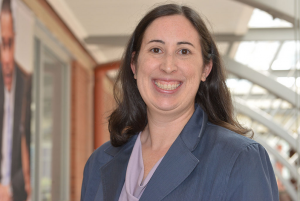Dr. Kari Taylor, Assistant Professor-in-Residence and Program Director of the UConn HESA program, says her path in the field of higher education and student affairs started in her freshman year of college – although she didn’t know it at the time. As a high school student she had a passion for journalism, and she decided to leave her home state of Kansas to pursue an undergraduate degree in magazine journalism at the University of Missouri. As an incoming student, she took part in the university’s Freshman Interest Groups (FIGs) program, in which small groups of first-year students live in the same residence hall and take three classes together. She ended up loving the FIGs program, especially the faculty who served as facilitators within the FIGs . “When I got to college, I was looking for an experience of advanced learning, so I was struck by the number of teachers who were giving very standard lectures and then getting back to their research,” says Taylor. “The FIGs teachers were really focused on teaching and learning, and I appreciated that.”
By her junior year, Taylor had become a peer advisor in the FIGs program, and she found herself wanting to spend more time on those responsibilities than in the newsroom. “I liked reporting and writing, but I was always more excited thinking about how to have conversations with residents in my living-learning community, how to design the curriculum for the extended orientation course I was helping teach,” says Taylor. It was then that she started looking into a master’s degree in the field of higher education and student affairs.
Her search led her to Miami University in Oxford, Ohio. The school was farther away from home than she ever imagined herself going, but it offered a unique graduate assistantship as the editorial assistant for a higher education and student affairs publication. In addition to her assistantship, the Miami curriculum allowed Taylor to specialize in college student development and college student cultures, a combination which she found “really exciting.” After graduating with her master’s degree, she took a position in Miami University’s Honors Program. She found the role to be diverse and dynamic, and because she kept “finding ways to grow and develop,” she chose to hone her professional practice there for seven years.
Toward the end of her tenure at Miami, Taylor found herself wrestling with some difficult questions. She found herself asking: how do diverse college students develop at a predominantly white institution? And are we doing enough to prepare students for a fulfilling life after college? “Students could do everything right: honors, straight A’s, a long list of co-curricular activities, and be well suited to go off to graduate school or pursue any position they wanted,” says Taylor, “but they hadn’t really thought about who they were or what they really valued.”
High GPA alone, she realized, would not set students up for success in the “real world” and, in fact, might set them up to have some real challenges.
Her desire to investigate these questions further led her to a Ph.D. program at The Ohio State University. She started the program thinking she wanted to return to undergraduate administration, but along the way she found herself drawn to preparing graduate students for the field and conducting research. As she prepared to return to full-time work within higher education and student affairs, she started looking for a faculty position within a cohort-based master’s program that emphasized the connection between classroom and practice. UConn met this criterion, and the program director role had the component of leadership and vision-setting for a program that excited her. So in the fall of 2017, Dr. Taylor came to UConn.
Broadly, Taylor’s research focuses on college students’ processes of learning and meaning-making. Her Ph.D. dissertation, which was a case study involving a civic engagement course, investigated students’ capacity to develop what scholars term “critical consciousness.” Developing students’ capacity for critical consciousness, says Taylor, means not only helping students learn about who they are but also about who they are in society, amidst systems of privilege and oppression. “I hope my research helps administrators understand that there’s a difference between promoting intercultural understanding and critical consciousness,” says Taylor.
“We focus a great deal on intercultural understanding, perhaps because it can be a little less politically charged. But I hope my research will show that critical consciousness is equally important in preparing our students for the diverse democracies that they will live and learn in, both in and beyond college.”
At UConn, Taylor continues to enrich the field of higher education and students affairs with her scholarship and teaching. The through line of all of her work, says Taylor, is learning. The specifics, however, are always evolving, and she knows that she won’t pursue the same topic for the rest of her life. Staying curious and relevant is crucial to who she is as a scholar, a practitioner, and a teacher.
“We’re always trying to prepare students for a world that isn’t yet here, that we don’t yet live in,” says Taylor. “This places a responsibility on us and also an opportunity to keep asking new and different questions.”
